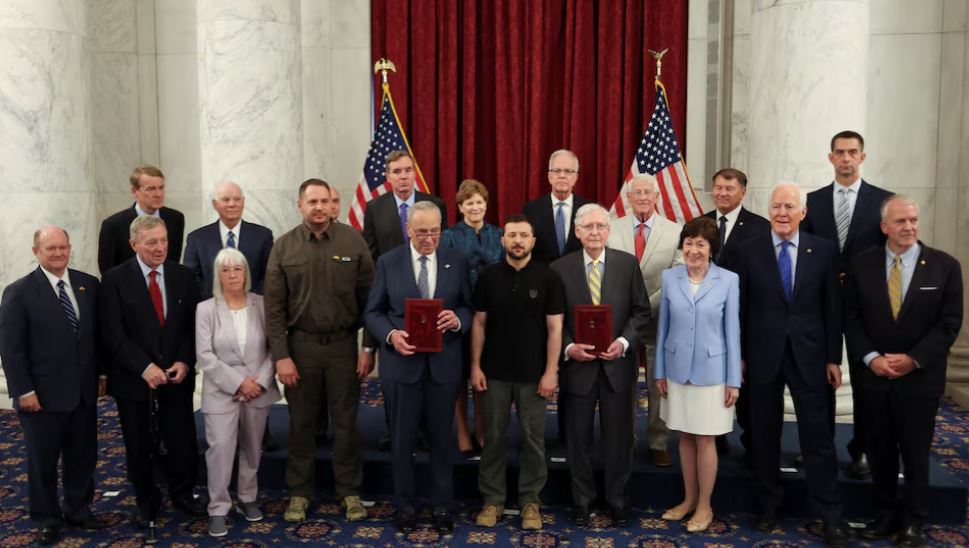Introduction: The Context of the Visit
Ukrainian President Volodymyr Zelenskiy’s recent visit to the U.S. Capitol marks a pivotal moment in international diplomacy. As the NATO summit unfolds, Zelenskiy aims to reinforce relationships with American lawmakers, a move crucial for securing continued U.S. aid for Ukraine. This mission is underscored by the looming uncertainty of the upcoming U.S. presidential election, where former President Donald Trump’s potential return could jeopardize future support.
Strengthening Ties: Meetings with Key Lawmakers
During his visit, Zelenskiy engaged with leaders from both the Senate and the House of Representatives. These meetings included prominent figures such as Senate Majority Leader Chuck Schumer, Republican Leader Mitch McConnell, and various committee members responsible for defense, spending, and national security.
Focus on National Security
“It’s an incredibly important mission and we’ve got to stand by Ukraine,” stated Senate Intelligence Committee Chairman Mark Warner, highlighting the visit’s significance. The ongoing conflict in Ukraine and its implications for global stability remain at the forefront of these discussions.
The Trump Factor: Election Concerns
The specter of the upcoming U.S. presidential election looms large over Zelenskiy’s visit. Incumbent President Joe Biden, a staunch supporter of aid to Ukraine, faces off against Donald Trump, who has expressed skepticism about the volume of assistance provided. This political dichotomy adds a layer of complexity to Zelenskiy’s diplomatic efforts.
A Gesture of Gratitude: Honors and Invitations
In a gesture of appreciation, Zelenskiy awarded the Order of Merit of Ukraine to Senate Republican leader Mitch McConnell. This was followed by a luncheon with a bipartisan group of senators. Zelenskiy also extended an invitation to Republican House Speaker Mike Johnson to visit Kyiv, an offer Johnson found challenging to accommodate due to the tight schedule leading up to the November elections.
Navigating Political Tightropes
Johnson, a close ally of Trump, acknowledged the difficulty of scheduling a visit to Ukraine before the elections. “We’d sure like to. The schedule’s pretty tight through the election for us, so it’s difficult to find the time to go, but we’d certainly like to,” he remarked, reflecting the intricate balance of political commitments and international responsibilities.
Biden’s Position: Support and Scrutiny
President Biden’s support for Ukraine remains strong, yet his recent debate performance against Trump and declining public approval ratings have fueled doubts about his leadership. A segment of congressional Democrats has even suggested Biden step aside, adding internal political pressure to the external diplomatic challenges.
The Trump Plan: Conditional Support
Recent reports indicate that Trump advisers have proposed a plan to end Russia’s war in Ukraine contingent on Kyiv’s willingness to enter peace talks. This proposal suggests conditional U.S. weapon support, which underscores the potential shift in U.S. foreign policy should Trump reclaim the presidency.
Urgency in Action: Zelenskiy’s Appeal
In a powerful speech, Zelenskiy implored U.S. political leaders not to delay their support for Ukraine until after the U.S. elections. He emphasized the need for fewer restrictions on U.S. weaponry to bolster Ukraine’s defense capabilities.
Congressional Dynamics: Bipartisan Support and Opposition
Within Congress, the division on Ukraine aid is stark. While many of Trump’s closest allies have consistently voted against assistance, a coalition of Democrats and internationally-minded Republicans have worked together to approve substantial aid packages. Since Russia’s invasion in February 2022, the U.S. has provided $175 billion in aid to Ukraine.
Shifts in Support: Johnson’s Changing Stance
House Speaker Johnson, initially opposed to additional funding for Ukraine, shifted his stance in April, allowing a vote on a $61 billion assistance package. This change in position reflects the evolving dynamics within Congress and the influence of broader national security considerations.
National Security Concerns: Johnson’s Address
In his first major national security address, Johnson articulated the broader threat posed by Russia beyond Ukraine. He noted the American public’s support for aiding Ukraine, recognizing the critical importance of preventing Russian President Vladimir Putin’s further aggression.
Conclusion: The Road Ahead
Zelenskiy’s visit to Washington underscores the intricate interplay of international diplomacy and domestic politics. As Ukraine continues to navigate its path amid a turbulent geopolitical landscape, the steadfast support of the U.S. remains vital. The outcome of the forthcoming U.S. elections will undoubtedly shape the future of this alliance, making Zelenskiy’s mission to secure unwavering support all the more critical.
Soumya Smruti Sahoo is a seasoned journalist with extensive experience in both international and Indian news writing. With a sharp analytical mind and a dedication to uncovering the truth, Soumya has built a reputation for delivering in-depth, well-researched articles that provide readers with a clear understanding of complex global and domestic issues. Her work reflects a deep commitment to journalistic integrity, making her a trusted source for accurate and insightful news coverage.



